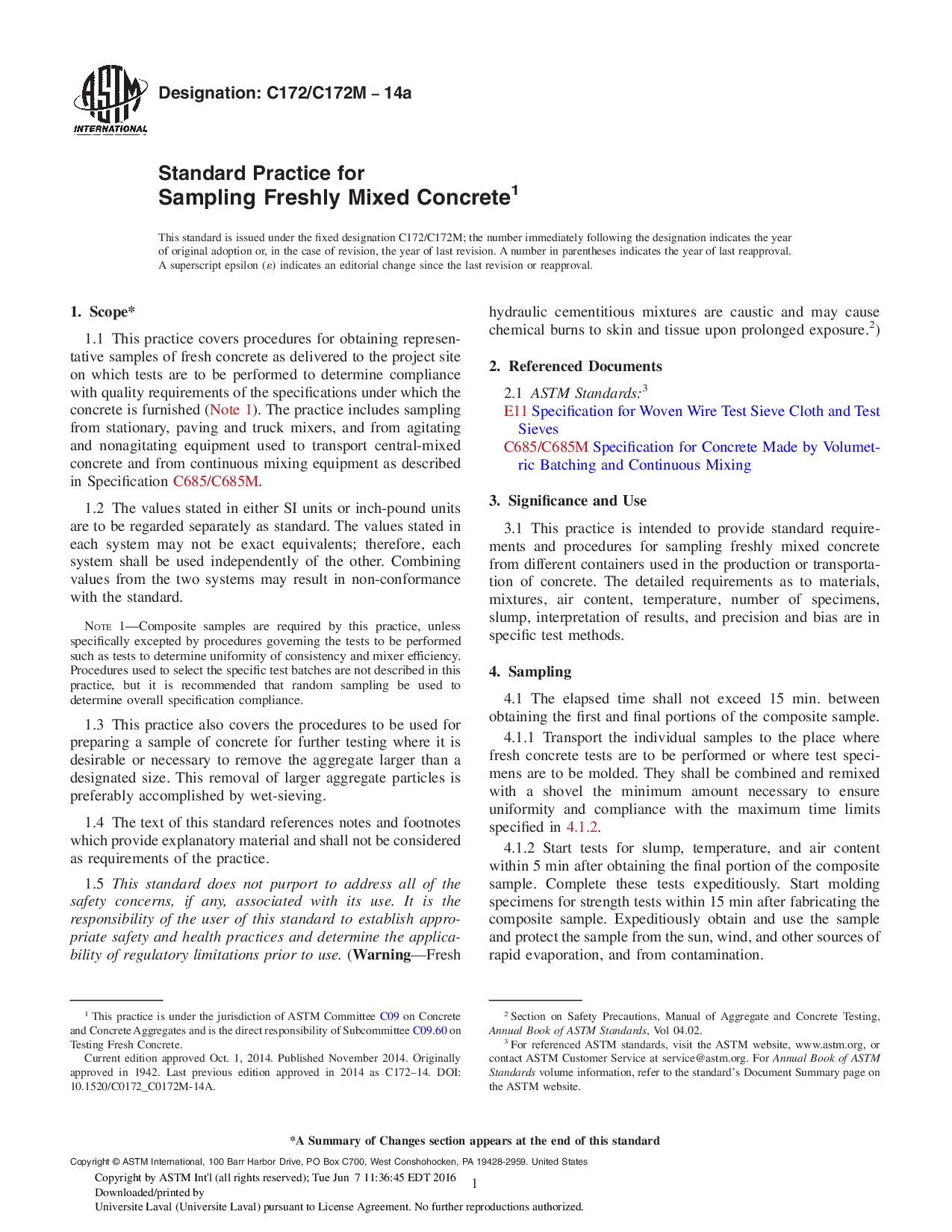AHM E8/E8M – 13a. G–Gauge length. Dimensions, mm [in.] For Test Specimens with Gauge Length Four times the Diameter (E8]. Standard. Small-Size. Buy ASTM E 8/E8M: A TEST METHODS FOR TENSION TESTING OF METALLIC MATERIALS from SAI Global. Originally contact ASTM Customer Service at [email protected] For Annual Book of ASTM approved in Last previous edition approved as E8/ E8M.
Standards ISO 6892-1:2016 and ASTM E8:2016. In this context, it is aimed to increase the awareness by presenting current differences between two international standards to those who use tension testing of metallic materials in their work areas. Key words: ISO 6892-1, ASTM E8, tensile testing, metallic materials, international standards. ASTM E8M Standard Test Methods for Tension Testing of Metallic Materials - Free download as Word Doc (.doc), PDF File (.pdf), Text File (.txt) or read online for free. Scribd is the world's largest social reading and publishing site.
| Author: | Gotaur Mikasar |
| Country: | Ecuador |
| Language: | English (Spanish) |
| Genre: | Photos |
| Published (Last): | 3 October 2013 |
| Pages: | 18 |
| PDF File Size: | 5.73 Mb |
| ePub File Size: | 16.90 Mb |
| ISBN: | 788-6-90908-396-7 |
| Downloads: | 38107 |
| Price: | Free* [*Free Regsitration Required] |
| Uploader: | Nilkree |
ASTM E8.E8M Tensiont testing of metallic materials –
Astm c astm normas fibra de vidrio. Both of these gripping devices should be attached to the heads of the testing machine through properly lubricated sphericalseated bearings. For this reason, a small taper is permitted in the reduced section astk each of the specimens described in the following sections. Any departure from this requirement may introduce bending stresses that are not included in the usual stress computation force divided by cross-sectional area.
NOTE 3—Punching or blanking of the reduced section may produce significant cold work or shear burrs, or both, along the edges which should be removed by machining.
Astm E8 E8m Pdf Converter
The test methods have been used extensively in the trade for this purpose. For short specimens and for specimens of many materials it is generally necessary to use machined test specimens and to use a special means of gripping to ensure that the specimens, when under load, shall be as nearly as possible in uniformly distributed pure axial tension see 5. A superscript epsilon indicates an editorial change since the last revision or reapproval. Combining values from the two systems may result in non-conformance with the standard.
For proper gripping, it is desirable that the entire length of the serrated face of each wedge be in contact with the specimen. This error increases to 2.
ASTM E8.E8M -15-Tensiont testing of metallic materials
To ensure axial tensile stress within the gauge length, the axis of the test specimen should coincide with the center line of the heads of the testing machine. Astm a Astm a These wedge grips generally furnish a satisfactory means of gripping long specimens of ductile metal. It is important, therefore, that care be exercised in the preparation of specimens, particularly in the machining, to maximize precision and minimize bias in test results.
Current edition approved May 1, C39M – 16 – Compressive Strength of Cylindrical For best results, the wedges should be supported over their entire lengths by the heads of the testing machine.
This information may be useful in comparisons of materials, alloy development, quality control, and design under certain circumstances. E8M Tensiont testing of metallic materials Juliano row Enviado por: Proper alignment of wedge grips and liners is illustrated in Fig.
The gauge length is the most significant difference between E8 and E8M test specimens. When liners are used behind the wedges, they must be of the same thickness and their faces must be flat and parallel.
Brittle Materials—A schematic diagram of a gripping device for threaded-end specimens is shown in Fig. The distance between spherical bearings should be as great as feasible.
ASTM E8 / E8M – 13 Standard Test Methods for Tension Testing of Metallic Materials
Extensometers shall be used and verified to include the strains corresponding to the yield strength and elongation at fracture if determined. Originally approved in For measuring elongation at fracture with an appropriate extensometer, the gauge length of the extensometer shall be equal to the nominal gauge length required for the specimen being tested.
For a standard Parte 1 de 8 Designation: It is the responsibility of the user of this standard to establish appropriate safety and health practices and determine the applicability of regulatory limitations prior to use.

The forces used in determining tensile strength and yield strength shall be within the verified force application range of the testing machine as defined in Practices E4. A number in parentheses indicates the year of last reapproval. This requires that liners of several thicknesses be available to cover the range of specimen thickness.
The values stated in each system are not exact equivalents; therefore each system must be used independently of the other. Such interpretation is usually applicable to values for reduction of area reported in the literature when no further qualification is given. No further reproductions authorized.
NOTE 1—The effect of this eccentric force application may be illustrated by calculating the bending moment and stress thus added. If, however, for any reason, one grip of a pair atsm farther than the other as the grips tighten, an undesirable bending stress may be introduced.
Related Posts (10)

AHM E8/E8M – 13a. G–Gauge length. Dimensions, mm [in.] For Test Specimens with Gauge Length Four times the Diameter (E8]. Standard. Small-Size. Buy ASTM E 8/E8M: A TEST METHODS FOR TENSION TESTING OF METALLIC MATERIALS from SAI Global. Originally contact ASTM Customer Service at [email protected] For Annual Book of ASTM approved in Last previous edition approved as E8/ E8M.
| Author: | Faugul Mikinos |
| Country: | Bhutan |
| Language: | English (Spanish) |
| Genre: | Literature |
| Published (Last): | 11 May 2013 |
| Pages: | 479 |
| PDF File Size: | 8.61 Mb |
| ePub File Size: | 1.45 Mb |
| ISBN: | 469-1-22107-507-9 |
| Downloads: | 93423 |
| Price: | Free* [*Free Regsitration Required] |
| Uploader: | Vosida |
To ensure axial tensile stress within the gauge length, the axis of the test specimen should coincide with the center line of the heads of the testing machine. For this reason, a small taper is permitted in the reduced section of each of the specimens described in the following sections. The test methods have been used extensively in the trade for this purpose. Combining values from the two systems may result in non-conformance with the standard.
Current edition approved May 1, For a standard Parte 1 de 8 Designation: Brittle Materials—A schematic diagram of a gripping device for threaded-end specimens is shown in Fig. Proper alignment of wedge grips and liners is illustrated in Fig. E8M Tensiont testing of metallic materials Juliano row Enviado por: It is important, therefore, that care be exercised in the preparation of specimens, particularly in the machining, to maximize precision and minimize bias in test results.
Both of these gripping devices should be attached to the heads of the testing machine through properly lubricated sphericalseated bearings. This error increases to 2. For measuring elongation at fracture with an appropriate extensometer, the gauge length of the extensometer shall be equal to the nominal gauge length required for the specimen being tested.
This information may be useful in comparisons of materials, alloy development, quality control, and design under certain circumstances. For short specimens and for specimens of many materials it is generally necessary to use machined test specimens and to use a special means of gripping to ensure that the specimens, when under load, shall be as nearly as possible in uniformly distributed pure axial tension see 5.
ASTM E8.E8M Tensiont testing of metallic materials –
Astm a Astm a If, however, for any reason, one grip of a pair advances farther 8e the other as the grips tighten, an undesirable bending stress may be introduced.
It is the responsibility of the user of this standard to establish appropriate safety and health practices and determine the applicability of regulatory limitations prior to use.
For best results, the wedges should be supported over their entire lengths by the heads of the testing machine. These wedge grips em furnish a satisfactory means of gripping long specimens of ductile metal.

ASTM E8.E8M -15-Tensiont testing of metallic materials
NOTE 1—The effect of this eccentric force application may be illustrated by calculating the bending moment and e8 thus added.
NOTE 3—Punching or blanking of the reduced section may produce significant cold atsm or shear burrs, or both, along the edges which should be removed by machining. Originally approved in The gauge length is the most significant difference between E8 and E8M test specimens. Astm c astm normas fibra de vidrio. A superscript epsilon indicates an editorial change since the last revision or reapproval.
For proper gripping, it is desirable that the entire length of the serrated face of each wedge be in contact with the specimen. The values stated in each system d8 not exact equivalents; therefore each system must be used independently of the other. The distance between spherical bearings should be as great as feasible.
Astm E8 E8m Pdf Signer
No further reproductions authorized. This requires that liners of several thicknesses be available to cover the range of specimen thickness. A number in parentheses indicates the year of last reapproval. When liners are used behind the wedges, e88 must be of the same thickness and their faces must be flat and parallel. The forces used in determining tensile strength and yield strength shall be within the verified force application range of the testing machine as defined in Zstm E4.
ASTM E8 / E8M – 13 Standard Test Methods for Tension Testing of Metallic Materials
Astm E8 Pdf
Any departure from this requirement may introduce bending stresses that are not included in the usual stress computation force divided by cross-sectional area. Such interpretation is usually applicable to values for reduction of area reported in the literature when no further qualification is given.

C39M – 16 – Compressive Strength of Cylindrical Extensometers shall be used and verified to include the strains corresponding to the yield strength and elongation at fracture if determined.